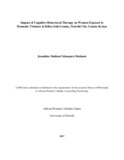| dc.description.abstract | The study was to determine the impact of Cognitive Behavioral Therapy (CBT) among women exposed to domestic violence within Kibra Sub-County, Nairobi City County. The problem of domestic violence is on the increase with cases of assaults being reported on daily basis. This study embarked on finding out how this menace can be mitigated using CBT. In order to achieve the goal of the research, it was important to establish the various forms of domestic violence among the study participants; assess the influence of demographic variables on domestic violence; determine the association of domestic violence with anxiety and depression; establish efficacy of CBT in reducing the levels of anxiety and depression among the intervention group; explore factors associated with the level of effectiveness of CBT, and lastly, establish the impact of CBT on domestic violence among the study population. The study was a mixed method research of both quantitative and qualitative approaches. The target population was women aged 18 years and above living within Kibra Sub-County who had been exposed to domestic violence. A representative survey was done in selected health facilities within Kibra Sub-County leading to a sample size of 166 participants. The study achieved 155 participants, 45 for intervention and non-intervention groups, and 110 participants for Focus Group discussions (FGDs) since eleven participants failed to turn up. Quantitative data was collected using different questionnaires. The data was analyzed applying three approaches: Univariate; Bivariate; and Multivariate Analysis (MANCOVA). The qualitative approach was done using In-depth Interviews with eight key informants and FGDs. Qualitative data was transcribed and analyzed using thematic and content analysis. Cronbach Alpha was used to test for reliability of the study tools. Research findings show people mostly affected by domestic violence are women and children. Domestic violence occurs mostly when there is a misunderstanding between partners. The findings show that perpetrators of domestic violence are controlling, on the other hand victims are people who feel worthless and inferior. Eight in ten women (80%) suffer emotional and psychological abuse, economic coercion, physical violence and sexual assault. Only 62% women experience the use of children to control them. Various factors trigger domestic violence especially previous relationships and cultural expectations. The study shows social demographics influence the occurrence of different forms of domestic violence. Sexual assault is highly influenced by household income, while economic coercion is influenced by number of children. Use of children to control the partner is highly influenced by age and marital status. There is a significant association of domestic violence with anxiety and depression because domestic violence leaves victims with negative effects especially depression and anxiety. Findings show that women cope with domestic violence mostly by persevering and few others opt for counseling. The effectiveness of CBT depends on various factors especially the number of sessions attended. Research findings show that African cultural tailored CBT has both short-term and long-term impact on the lives of women exposed to domestic violence and psychological disorders. As part of recommendations for effectiveness of CBT, clients need to attend a minimum of 14 to 16 sessions. In addition, support systems available need to restructure the strategies of alleviating the negative impacts of domestic violence. | en_US |



